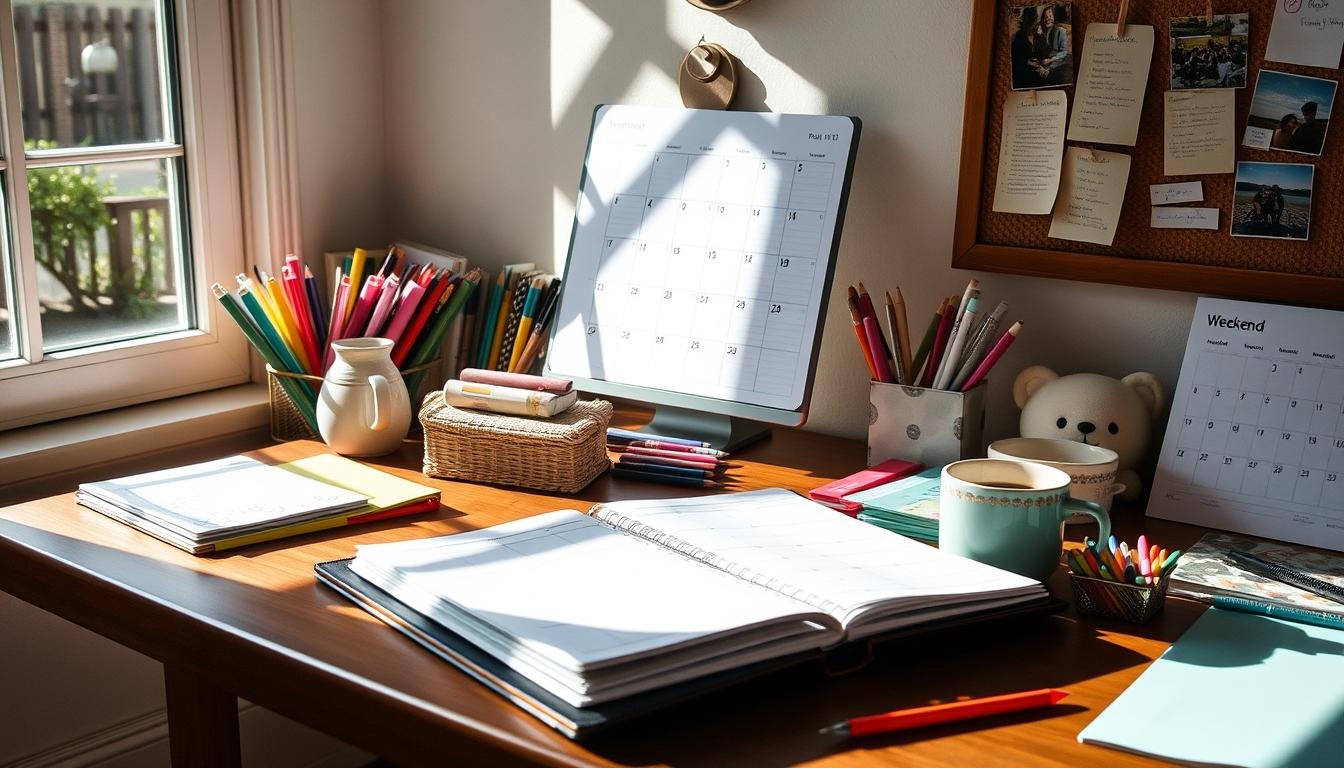A serene and organized workspace featuring a planner, colourful sticky notes, a coffee cup, and a cosy blanket draped over a chair, with a sunlit window in the background, conveying a sense of calm and productivity for weekend planning.
Weekend planning can turn stress into smooth sailing. Thoughtful planning helps you make the most of your time.
It’s about creating fun and meaningful experiences. Good planning balances relaxation and getting things done.
Think about your goals and social plans. Also, don’t forget about your well-being.
A structured approach can reduce stress. It can make your weekends more enjoyable and fulfilling.
Let’s explore ways to improve your weekend experiences. We’ll cover organizing tips and self-care practices.
Understanding the Importance of Planning Your Weekend
Weekend planning can make ordinary days unforgettable. It helps you manage time better and reach your full potential.
Good planning creates space for rest and growth. It balances work and fun for a better life.
Thoughtful planning helps you recharge and prepare for challenges. It reduces stress and last-minute problems.
The core benefits of weekend planning include:
- Reduced stress levels
- Enhanced personal productivity
- Better work-life integration
- Improved mental clarity
- More meaningful personal experiences
Planning your weekend gives you control over your time. It turns chaos into a well-organized life experience.
Key Considerations for the Weekend Before
Pre-event planning needs innovative thinking and good organization. Make a detailed event checklist to guide you.
Break tasks into smaller parts. Focus on the most important things first.
Create a timeline to track progress. This helps reduce stress and work better.
Manage your time wisely during weekend prep. Set specific times for tasks and rest.
Use digital tools to help plan. They can make things easier.
Take practical steps for success. Gather documents, confirm bookings, and check important details.
A good checklist turns chaos into smooth prep. Careful planning helps avoid last-minute worries.
Stay flexible in your planning. Be ready to handle unexpected changes.
Fun Activities for the Weekend Before
Pre-event activities can turn a stressful weekend into a great one. Fun ways to relax help manage excitement and keep your mind fresh.
Weekend fun offers perfect stress relief chances. Try outdoor adventures like hiking or exploring parks.
These activities give you exercise and a mental break. They help you face challenges with new energy.
Group activities can be great for stress relief. Plan a game night or try a cooking class.
Join a local event. These social times create happy memories.
Solo fans might enjoy painting, journaling, or learning something new online. Virtual classes keep your mind busy without being too much.
Physical wellness is key in managing pre-event stress. Try yoga, meditation, or gentle exercise routines.
These activities calm your nerves. They get your mind and body ready for challenges.
Free museum days and farmers markets are budget-friendly options. Community workshops can provide fun weekend entertainment.
These experiences offer relaxation and stay affordable—balance prep with rest.
Pick activities that make you happy. Choose things that help you feel calm and confident.
Preparing for the Weekend After
A cosy home workspace with an organized planner open on a desk, surrounded by colourful stationery, a steaming cup of coffee, and a calendar marking the weekend. Sunlight streams through a window, casting soft shadows, with a bulletin board displaying photos and notes from the recent event: relaxed atmosphere and a sense of anticipation for the upcoming weekend activities.
Post-event planning is key to a smooth weekend recovery. In your weekend strategy, focus on rest, reflection, and gentle recharging.
Create a flexible schedule with ample recovery time. Don’t overwhelm yourself with too many commitments.
Start your post-event weekend with a calm morning routine. Review event highlights and jot down key learnings.
Set aside moments for personal reflection. This helps you transition back to your regular rhythm.
Recovery time isn’t just about physical rest. Try light activities like short walks or gentle yoga.
Reading a book can help your body and mind reset. These activities aid in unwinding after an intense event.
Make self-care a priority during your post-event weekend. Prepare nutritious meals and catch up on sleep.
Engage in a hobby that brings you joy—balance relaxation with gentle productivity in your weekend plan.
Spend a small portion of time on practical tasks. Organize photos and respond to follow-up communications.
Update your notes from the event. Keep these tasks minimal to avoid burnout.
The goal is to restore your energy. Process your experiences and prepare for upcoming challenges.
Time Management Techniques for Both Weekends
Plan your weekend smartly to make the most of your time. Create a flexible approach that fits different weekend plans.
Try time blocking to boost your weekend productivity. Divide your day into segments for specific tasks.
Use the Pomodoro Technique for better focus. Work for 25 minutes, then take a 5-minute break.
Make a list of tasks by importance. Focus on activities that match your goals.
Use apps to track tasks and manage your calendar. These tools help you stay organized on weekends.
Find a balance between being productive and relaxing. Try different methods to see what works best for you.
Family and Social Engagement Ideas
Thoughtful planning can turn ordinary moments into extraordinary memories. Family activities build strong bonds during busy weekends.
Plan intentional family time. Try board games, backyard picnics, or cooking adventures.
Simple, spontaneous moments often create lasting connections. Mix structured and flexible activities for easier social planning.
Rotate weekend responsibilities among family members. One person could organize a park meetup.
Another might plan a virtual game night with relatives or friends. Technology can enhance social connections during hectic times.
Group video calls and shared online experiences help bridge distances. These digital interactions complement in-person weekend gatherings.
Quality time matters more than quantity. Even 30 minutes can strengthen relationships.
Focus on meaningful talks, shared laughter, and genuine engagement. These make weekend social planning truly valuable.
Self-Care Practices for the Weekends
Weekend self-care helps manage well-being and reduce stress. It resets your mental and physical state through relaxation techniques.
Physical activities are key for weekend self-care. Try gentle exercises like yoga, walking, or swimming.
These activities release endorphins and improve mood. Outdoor activities connect you with nature and boost wellness.
Mindfulness practices are powerful relaxation techniques. Meditation, deep breathing, and journaling can calm your mind.
Set aside time each day for these techniques. Create a peaceful mental space away from daily pressures.
Develop a personalized self-care routine. This might include baths, reading, music, or creative hobbies.
Choose activities that help you unwind and feel refreshed. Digital detox is crucial for weekend stress management.
Limit screen time and disconnect from work emails. Focus on activities that bring joy and relaxation.
This approach resets your mental energy. It prepares you for the upcoming week.
Tips for a Smooth Transition Between Weekends
Plan for weekend transitions. Know your energy levels and create a flexible routine.
Each weekend brings unique challenges. It also offers chances for personal growth.
Set clear boundaries between weekend activities. Use journaling or meditation to process experiences.
This method helps keep your mind clear. It also stops you from feeling overwhelmed.
Create a gentle reentry plan. Allow time to buffer between events and your regular schedule.
Focus on self-care activities. Try light exercise, healthy eating, and getting enough rest.
Develop a personal transition ritual. It signals your mind and body to shift gears.
Try a specific playlist or a quiet morning review. A short walk can help you refocus.
Treat weekend transitions as times for reflection. Turn potential stress into chances for growth.
FAQ
How far in advance should I start planning for the weekend before an important event?
Start planning at least two weeks. This gives you time to create a checklist and organize tasks.
You’ll feel more relaxed and prepared as the event gets closer.
What are some practical ways to manage stress during the weekend before an event?
Try meditation, light exercise, or hobbies to relieve stress. Use time blocking and break tasks into smaller, manageable steps.
Set aside time for relaxation to prevent burnout.
How can I balance event preparation with family time during the weekend?
Create a flexible schedule for event prep and family activities. Involve family members in tasks when possible.
Set aside event-free family time. Good communication and planning are essential.
What should I focus on during the weekend after an event?
Prioritize rest and reflect on the event’s highlights. Organize follow-up tasks and document important memories or learnings.
Slowly transition back to your routine. Don’t rush into full productivity.
How can I effectively manage my time during both weekends?
Use the Pomodoro Technique and create detailed to-do lists. Break down large tasks into smaller, actionable steps.
Use planners to track progress and allocate time blocks for different activities.
What self-care practices are most beneficial during these weekends?
Focus on activities that help you relax, like meditation, yoga, or reading. Get enough sleep, eat well, and stay hydrated.
Try journaling or light exercise to mentally and physically reset.
How do I handle unexpected challenges during weekend planning?
Stay flexible and have a backup plan. Build buffer time into your schedule.
Practice mindfulness to manage stress. Be willing to adjust your plans as needed.
What are some tips for transitioning smoothly between weekends?
Create a transition ritual to shift gears mentally. Review accomplishments and set new goals.
Maintain a consistent sleep pattern. Use the experience for personal growth and learning.
you may also read : Delicious Ice Cream Cone Edibles: Sweet Cannabis Treats
